
Diversity, Equity & Inclusion
Voices for a Better World
Visibility & Celebration
October 2023 | Arundhati Roy

Born in Kerala, India, in 1960, Arundhati Roy rose to international renown with her first novel, The God of Small Things. It won the prestigious Booker Prize for Fiction in 1997 and has been translated into more than 30 languages. Set in 1969, it tells the story of a family in India whose perspective is changed by a visit from their relatives who live in England. Read the first chapter.
Learn more about the novel and various reactions to it.
While Roy continues to write both fiction and nonfiction, she has also used her literary fame to advocate for justice related to human rights issues and environmental abuses. She has been honored with numerous accolades for both her writing and her activism, including the Lannan Prize for Cultural Freedom. On September 12, 2023, she won the 45th European Essay Prize for lifetime achievement. Read or watch her acceptance speech, where she discusses the role of writers in telling hard truths to society.
October 2023 | Edmonia Lewis
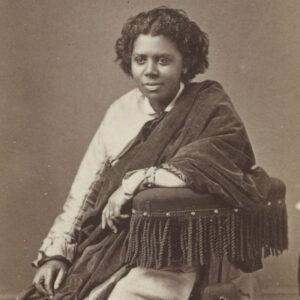
Sculptor Edmonia Lewis was born in 1844 to a Black Haitian father and part-Chippewa mother. She was able to attend Oberlin College, but was a victim of hate crimes and was ultimately driven out by false accusations. Despite these obstacles, she moved to Boston and began a career as an artist. Though she struggled to access the traditional education available to white male sculptors of her day, she rose to both national and international prominence in the 1860s and beyond, moving to Rome in 1866. She used classical styles to portray Black, indigenous, and female subjects with strength and beauty.
For example, her indigenous sculptures Old Arrow Maker (1866, below left) and Hiawatha’s Marriage (1874, below right) both portray scenes from the famous poem “The Song of Hiawatha,” showing the dignity and beauty of these characters.
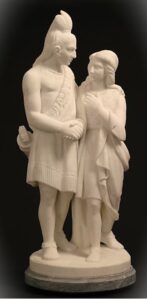 |
Her sculpture Forever Free (1867-68, below left) dramatizes and celebrates the end of slavery in the United States. It is significant because it shows its Black subjects in classical Roman garb, as cultured and strong, instead of the common trend to portray Black people as primitive. Similarly, her statue of Hagar (1875, below right) shows the slave Hagar from the Biblical story of Abraham after Abraham’s wife has used her and cast her out. The work again depicts her with dignity and draws a parallel to the exploitation and abuse of slavery in the United States.
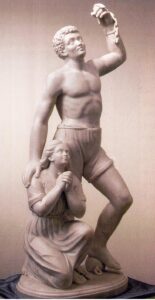 | 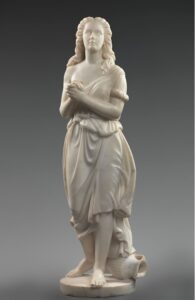 |
Her works can be found today at the Smithsonian and Metropolitan Museum of Art, among other prestigious institutions.
Learn more about her life and work.
October 2023 | Ben Barres

Neuroscientist Ben Barres was a crucial pioneer in our understanding of the active role that glial cells (the non-neuron components of the brain) play in brain function and dysfunction. He discovered that these cells play a critical part in making synaptic connections between the neurons of the brain. Until his death in 2017, he worked to discover the root causes of degenerative brain diseases such as Alzheimer’s and Parkinson’s, making strong progress on understanding the role of microglia and astrocytes in these diseases.
He trained at MIT, Dartmouth College, Cornell University, Harvard Medical School, and University College London before ultimately becoming a professor at Stanford University. As a transgender man, he was profoundly affected by the difference in his experience in the sciences as a woman in graduate school and then after his transition. He published an article arguing against gender biases in Nature—“Does gender matter?” (2006)—and worked tirelessly to improve access and representation in the sciences for women, the LGBT+ community, and people with disabilities (he also had prosopagnosia (the inability to recognize faces). His memoir The Autobiography of a Transgender Scientist was published posthumously in 2018.
Learn more about his life and work, through his obituary in Stanford Medicine and a review of his memoir.
March 2023 | Joseph Bologne, le Chevalier de Saint-Georges
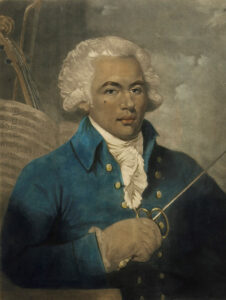
Born on the Caribbean island of Guadaloupe to a wealthy French father and slave mother Nanon, he was sent to the French court at age 7. He became one of the most accomplished swordsmen in Europe, and gained international renown as a composer, violinist, and conductor. He was named music director of the Paris Opera, but his appointment was blocked due to his race. He later served as a colonel in the first all-black regiment in Europe during the French Revolution. Sometimes referred to as “Le Mozart noir” (the Black Mozart), John Adams declared him “the most accomplished man in Europe.”
Listen to a sample of one of his compositions, the “Allegro” from the Symphonie Concertante in G Major, performed by the Buskaid Soweto String Ensemble: https://www.youtube.com/watch?v=VRBUA5rgaLs
Check out the trailer for a movie about his incredible life here: https://www.youtube.com/watch?v=-LtCIImfSCk
Find out more about Joseph Bologne.
March 2023 | Kenneth and Mamie Phipps-Clark
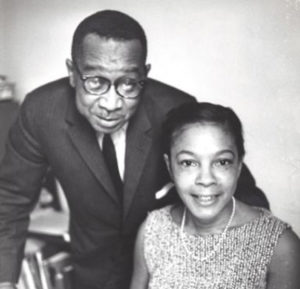
The Clarks were influential to the Civil Rights movement and their expertise allowed them to testify as expert witnesses in several school desegregation cases, including Brown vs. Board of Education of Topeka, KS in 1954. Before his time on the Supreme Court, the Clarks worked with Thurgood Marshall on their famous doll experiment, which investigated children’s attitudes towards race. Their work influenced national public policy and, through the use of empirical research, contributed to the end of segregation.
To learn more about their amazing lives, check out the American Psychological Association’s biography: https://www.apa.org/pi/oema/resources/ethnicity-health/psychologists/clark
You can listen to or read a 1964 interview with Kenneth Clark here: https://whospeaks.library.vanderbilt.edu/interview/kenneth-bancroft-clark
Brown vs. Board
Civil rights leaders chose to pursue this particular case to end segregation because it offered them the best chance to prove that “separate but equal” was not possible. The school in question (now a historic site in Topeka) was a high-quality institution, so no one could argue that the only problem was that the school itself was inferior. Instead, the law team sought to prove that “separate” was inherently unequal, creating lasting divisions and negatively impacting children of all races.
To learn more about the doll test and its significance, check out this article: https://www.naacpldf.org/brown-vs-board/significance-doll-test/ or this video: https://www.youtube.com/watch?v=loqzXCvazOI
March 2023 | Dolores Huerta
Huerta is an American labor leader and civil rights activist. In 1962, she founded The United Farm Workers Association with César E. Chávez, a fellow activist. Huerta is a recipient of the Presidential Medal of Freedom and was the first Latina inducted into the Women’s Hall of Fame.
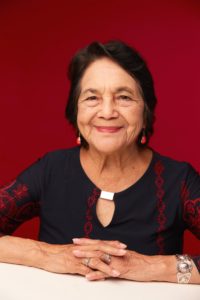
Huerta is an American labor leader and civil rights activist. In 1962, she founded The United Farm Workers Association with César Chávez, a fellow activist. Huerta is a recipient of the Presidential Medal of Freedom and was the first Latina inducted into the Women’s Hall of Fame.
At the Medal of Freedom ceremony in 2012, President Barack Obama explained his choice of Dolores Huerta for this award:
When César Chávez sat Dolores Huerta down at his kitchen table and told her they should start a union, she thought he was joking. She was a single mother of seven children, so she obviously didn’t have a lot of free time. But Dolores had been an elementary school teacher and remembered seeing children come to school hungry and without shoes. So in the end she agreed, and workers everywhere are glad that she did. Without any negotiating experience, Dolores helped lead a worldwide grape boycott that forced growers to agree to some of the country’s first farmworker contracts. And ever since she has fought to give more people a seat at the table. “Don’t wait to be invited,” she says, “Step in there.” And on a personal note, Dolores was very gracious when I told her I had stolen her slogan: “Sí se puede” (“Yes we can”). Knowing her, I’m pleased that she let me off easy, because Dolores does not play!
Video: https://youtu.be/MCAwRkZQM2E?t=554
Learn more about her outstanding life and achievements here: https://doloreshuerta.org/
PBS made a documentary about her life and impact, which you can rent here: https://www.youtube.com/watch?v=hVe7DZ6RLzo
